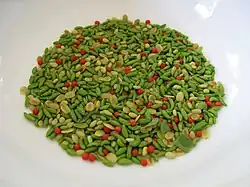 | |
| Place of origin | India |
|---|---|
| Main ingredients | seeds and nuts, essential oils (peppermint) |
.jpg.webp)
Mukhwas is a colorful Indian Ayurvedic[1] after-meal snack or digestive aid widely used as a breath freshener, especially after meals.[2] As per Agamas, Mukhwaas forms one of the components of sixteen upcharas (offerings) to a deity in a Puja, the Hindu mode of worship or prayer.[3] can be made of various seeds and nuts, often fennel, anise, coconut, coriander, and sesame. They are sweet in flavor and highly aromatic due to added sugar and the addition of various essential oils, including peppermint oil. The seeds can be savory or sweet—coated in sugar and brightly colored.[4]
History and etymology
The word is an amalgamation of the Sanskrit words mukh (mouth) and vaas (to stay/to keep).[3] Thus Mukhwaas refers to ingredients which are kept in mouth to keep it fresh. Mukhwaas forms an essential part of Hindu tradition of Shodash Shringar (sixteen embellishments).[5] The Hindu poet Keshavdas mentions Mukhwaas as one of the sixteen embellishments of Shodash Shringar tradition.[5] Mukhwaas initially evolved as an ayurvedic remedy which was used for making the mouth fresh after a meal. Apart from use as a breath freshner, it also serves as a post prandial digestive aid. Ancient Sanskrit literature and Medieval Hindu literature in Hindi, Rajasthani[6] and Gujarati languages is replete with mentions of Mukhwaas.
See also
References
- ↑ Patel, Ramesh (1997). The Mandeer Ayurvedic Cookbook. Psychology Press. ISBN 978-0-7007-0686-0.
- ↑ "Why are candy-coated fennel seeds served at Indian restaurants?". The A.V. Club. 5 March 2018.
- 1 2 www.wisdomlib.org (31 May 2018). "Mukhavasa, Mukhavāsa, Mukha-vasa: 7 definitions". www.wisdomlib.org. Retrieved 11 April 2023.
Mukhavāsa is a Sanskrit compound consisting of the terms mukha and vāsa (वास).
- ↑ Pursell, JJ (2015). The Herbal Apothecary: 100 Medicinal Herbs and How to Use Them. Portland: Timber Press. p. 36. ISBN 9781604696622. Retrieved 20 June 2016.
- 1 2 Dasa, Syamasundara (1965–1975). "Hindi sabdasagara". dsal.uchicago.edu. Retrieved 11 April 2023.
- ↑ "राजस्थानी सबदकोश". www.rajsabadkosh.org. Retrieved 11 April 2023.